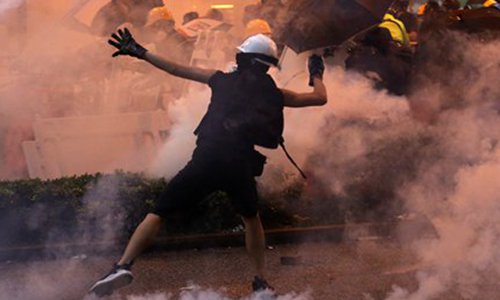
A Hong Kong protester throws a tear gas grenade at police. Photo: Cui Meng/GT
Hong Kong pro-establishment and opposition figures made a rare high-profile trip to the US to discuss a Hong Kong-related act last week, a move analysts believe will help thwart US attempts to interfere in Chinese affairs.
A seven-member Hong Kong delegation, made up of four executive councillors and three opposition lawmakers, met with US executive and legislative officials in California during a four-day visit from March 5 to 8.
The four-day program, themed "US-Hong Kong Dialogue," was part of the preparation work for a report on the implementation of the US-Hong Kong Policy Act due to be handed over to US Congress in late March.
The agenda of the dialogue included the "Hong Kong Human Rights and Democracy Act," relations between the Hong Kong Special Administrative Region (HKSAR) and the US, and human rights conditions in Hong Kong.
Horace Cheung Kwok-kwan, lawmaker and vice-chairman of the Democratic Alliance for Betterment and Progress, a pro-establishment party, told the Global Times upon his arrival in Hong Kong Tuesday morning that their objective in attending the dialogue was to explain to the US side the real situation in Hong Kong regarding the social unrest triggered by a now-withdrawn extradition bill that has been going on since last June, and to persuade the US not to sanction mainland and Hong Kong officials.
"We made use of this dialogue platform to state our stance, a platform that the US feels is suitable. It is up to them how much they listened, but I'm confident they understand our viewpoint and I'm positive that they will not impose sanctions," Cheung said.
Cheung posted about the dialogue on his Facebook page during his stay in the US. In a video post, he said if the US unreasonably pressures Hong Kong, it will only unite Hong Kong people to support the government, and history proves that China will never bow to external pressure.
Besides Cheung, the other three executive councillors included convenor Bernard Chan, councillor Martin Liao Cheung-kong, and founder and chairperson of the New People's Party Regina Ip Lau Suk-yee. Opposition lawmakers included Jeremy Tam Man-ho, Kenneth Leung and Charles Mok.
During the dialogue, opposition lawmakers raised the issue of the "brutality" of Hong Kong police and demanded sanctions from the US. They also provided a list of names that they wanted the sanctions to target.
The visit, financed by the US Department of State, was the first since US President Donald Trump signed into law the "Hong Kong Human Rights and Democracy Act" in November, a period marked by anti-government violent protests in Hong Kong.
The law allows Washington to impose sanctions on officials who it deemed to have violated human rights in Hong Kong. It also grants Washington the power to suspend Hong Kong's special trading status if it deemed that the city is not retaining sufficient autonomy under the "one country, two systems" framework.
China has criticized the US for interfering in the affairs of its special administrative region. Hong Kong Chief Executive Carrie Lam Cheng Yuet-ngor also slammed the US law as "completely unnecessary" and said "it is very regrettable that a foreign legislature and government have used their legislation to meddle in Hong Kong affairs."
It is rare for both pro-establishment and opposition figures from Hong Kong to appear at the same event with US executive and legislative branches. The pro-establishment camp explicitly objects to anti-government violent protests and US interference, while opposition figures have used the social unrest to curry favor from the US as a means to pressure the Hong Kong government and the central government.
Basa Leung, a political commentator based in Hong Kong, believes that the attendance by the pro-establishment camp at the four-day dialogue shows that it is acting responsibly in the interests of Hong Kong.
"Relations between the US and the HKSAR are important. The Hong Kong dollar is closely linked with the US dollar, which means the US has a huge impact on Hong Kong. Now that the US has signed the 'Hong Kong Human Rights and Democracy Act,' it is normal for Hong Kong to send delegates to the US for talks. If the pro-establishment camp does not go, it will be in a passive position in Hong Kong affairs, and what the US side hears will only be a one-sided story," Leung told the Global Times on Monday.
Tang Fei, a member of the Council of the Chinese Association of Hong Kong and Macao Studies, told the Global Times on Monday that the US Congress only listened to opposition viewpoints last year, but this time, executive councillors who know government policies well can give a balanced picture of Hong Kong.
Tang noted that Demosisto, the secessionist political group in Hong Kong, has been calling for the activation of the sanctions mechanism under the "Hong Kong Human Rights and Democracy Act," which aims to normalize and systemize US interference in Hong Kong affairs.
"At this juncture, if pro-establishment figures go to the US, they can understand what the US thinks of such moves by Hong Kong's opposition and lobby the US not to take actions that will hurt China-US ties and US ties with HKSAR," Tang said.
Tang warned the US not to see itself as a suzerain state or meddle in the affairs of China's Hong Kong.




